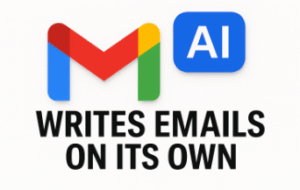“Google Unveils AI That Writes Emails Just Like You—DeepMind CEO Confirms!”
Artificial intelligence might eventually cure illnesses and tackle the climate crisis, but for the time being, the CEO of Google DeepMind is focused on a more relatable objective: mastering the contemporary email inbox. During his keynote speech at the SXSW festival in London, Demis Hassabis disclosed that his team is creating a sophisticated AI-powered email system designed to alleviate the strain of everyday digital communication. “What I really want, and what we’re working on right now, is figuring out if we can make a new kind of email,” he said. He added, “I would be super happy to get rid of my email. I’d be willing to spend thousands of dollars every month just to be free from it.”
The system would take care of daily messages on its own, reply in the way the user talks, and help figure out what needs to be dealt with right away, acting like a digital personal assistant. “Something that would just get what the important emails are, and respond in your way – and maybe make some of the simpler choices,” Hassabis explained.
Even though people often say AI can solve the biggest problems we face, Hassabis warned that we shouldn’t expect too much too soon. “Its effect is exaggerated in the short term,” he pointed out, but he also said that AI will create “deep changes in society over the long run.”

Besides making communication easier, Hassabis sees AI as a way to balance out the systems created by tech companies that try to grab our attention. “I’m really excited about the idea of a universal AI assistant that knows you well, makes your life better by giving you great suggestions, and helps with boring tasks for you,” he said. “[It] basically gives you more time and might protect your focus from other algorithms trying to get your attention. I believe we can actually use AI to help individuals.”
Hassabis also talked about the competition to create artificial general intelligence (AGI) â systems that can think like humans and handle many different tasks. He originally thought that universities would lead this effort, but the quick rise of AI in business has brought big companies into the mix much sooner than he thought.
With the stakes rising, he urged the United States and China to collaborate on safety protocols and global standards. “I hope at least on the scientific level and a safety level we can find some common ground, because in the end it’s for the good of all of humanity,” he said. “It’s going to affect the whole of humanity.”
Predicting AGI could arrive within five to ten years, he likened its arrival to a new Industrial Revolution. Looking ahead, he called on economists and social scientists to examine how prosperity driven by AI could be shared fairly. “Even in the good case where we get radical abundance and economic prosperity, can we make sure that’s fairly shared, and fairly distributed,” he said.
Sources – Talk Android
For AI & ML courses – DR AI Academy